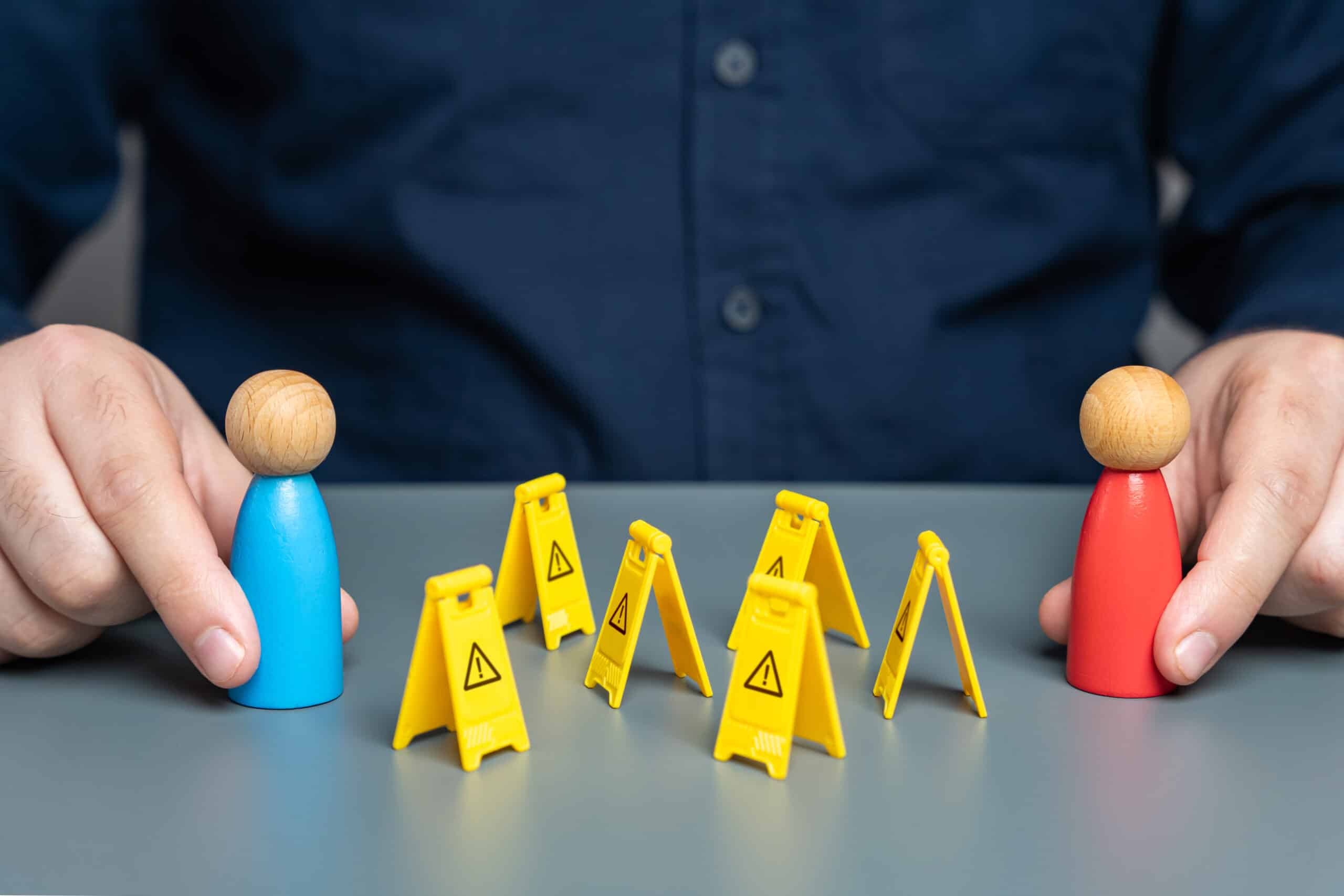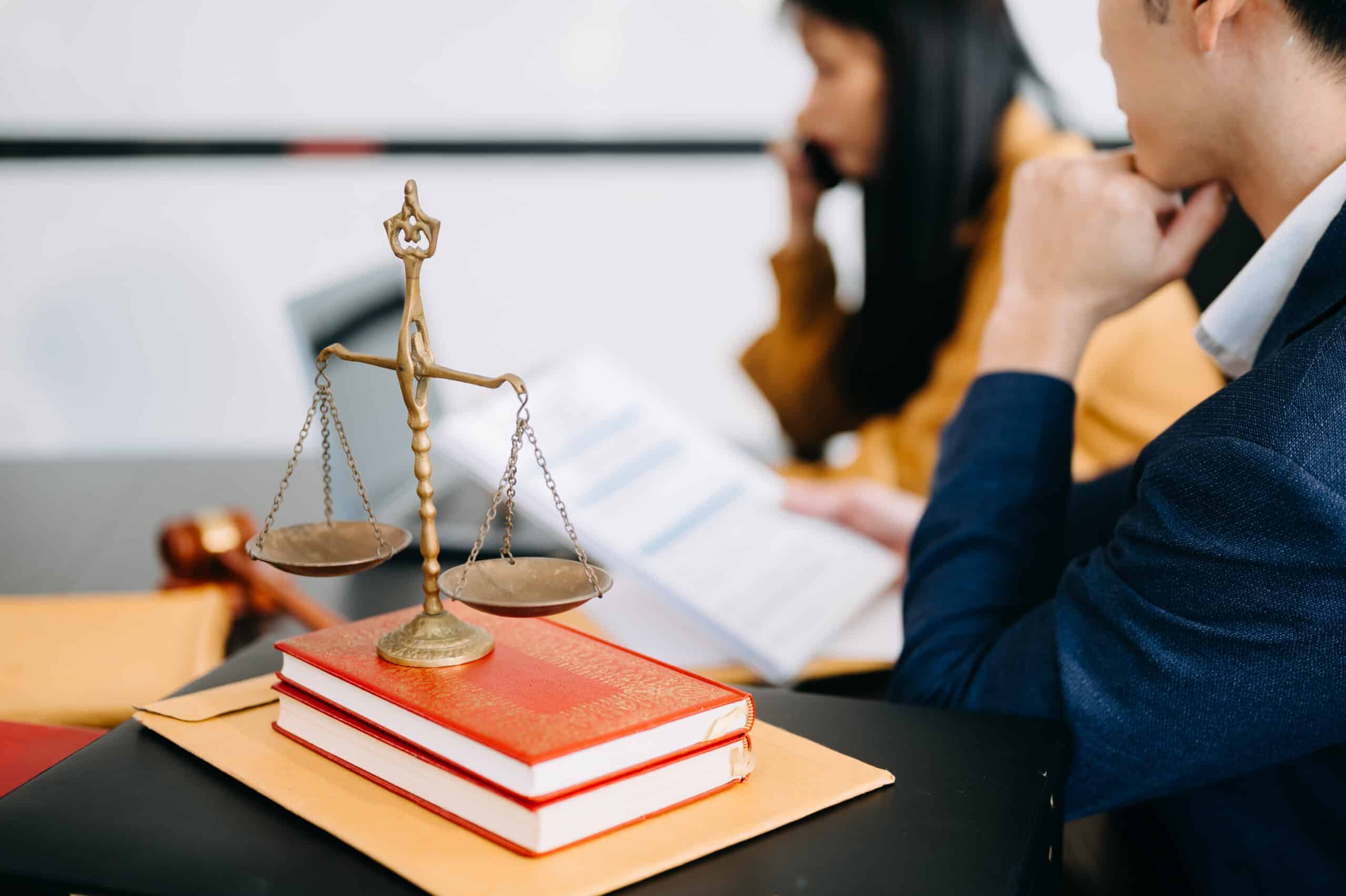Understanding the Impact of False Accusations in Legal Disputes

Being wrongly accused is a big issue in our legal system. It’s hurtful and embarrassing. Fabricated claims can have profound implications on everyone involved.
We find these claims often during disputes over child custody, property settlements, divorce, or domestic violence. It’s easy to get overwhelmed and emotional. But if they aren’t dealt with properly, they can sway case outcomes. Understand why they occur and the potential consequences.
Key takeaways
- False accusations are untrue claims made against a party to a legal dispute.
- False accusations can take many forms.
- People make false accusations for many different reasons.
- False accusations during custody cases may involve falsified evidence and emotional manipulation and coaching of the child.
- False accusations of domestic violence can include faked injuries and may have legal implications.
- Stay calm and gather evidence with your lawyer so you can file a response.
- A false accusation can lead to potential criminal penalties and family law consequences like failed custody bids.
What are false accusations?
A false accusation is an untrue claim made by one party against another. In cases involving child custody, divorce, and domestic violence, false allegations can emerge, where misleading statements are used to manipulate the outcome.
These allegations may result in legal actions and affect the nature of contact between parties, potentially leading to serious consequences and criminal implications for the accused. The nature of these false claims can vary, but they typically involve:
Child Abuse or Neglect
A false statement that one parent has abused or neglected the children can be considered a serious crime. Such accusations can significantly impact custody and visitation rights, affecting the contact the accused parent has with their children. This type of false allegation can lead to legal consequences and alter the dynamics between the parents involved.
Child abuse covers many different factors, including:
- Continually using shaming or belittling language.
- Constantly yelling, bullying, or threatening.
- Controlling children through fear and threats of violence.
- Unpredictability so the child won’t know what will trigger aggression.
Domestic Violence
Claims of physical, emotional, or sexual assault allegations that may not have occurred can significantly impact a person reputation. These false accusations can lead to restraining orders and influence custody decisions in court.
The accused may face serious consequences, including criminal charges, which could affect their ability to maintain custody or their overall standing in legal proceedings.
Domestic or family violence can include:
- Harming children or a partner through physical violence.
- Engaging in unwanted sexual contact.
- Preventing a partner’s financial or social independence.
Financial Deception
Allegations about hiding assets, misrepresenting financial status, or other forms of financial dishonesty aimed at influencing property settlements or spousal support.
Financial deception can be alleged in different ways, such as:
- Transferring money or other assets to a third party.
- Investing money in difficult-to-value unique items.
- Reducing the asset pool’s value through reckless spending.
Parental Alienation
Claims that one parent deliberately damages the children’s relationship with the other parent. These claims can affect custody arrangements.
There are various ways parental alienation can manifest:
- Speaking negatively about a parent’s intelligence or abilities as a parent.
- Preventing visitation by missing changeovers or cancelling plans.
- Undermining the other parent’s authority by encouraging the child to ignore their directions.
- Inducing the child to feel guilty about having a good relationship with the other parent.
Substance Abuse
False allegations of drug or alcohol addiction can be used to question a person’s ability to provide a safe and stable environment for their children. These accusations can suggest a crime has been committed, potentially impacting the court’s decisions in custody matters.
If you face such allegations, it is crucial to work with a lawyer to present evidence that refutes the claims and protects your rights as a person.
This can include accusations of:
- Excessive alcohol consumption.
- Abuse of prescription medication.
- Use of illicit substances.
Mental Health
Some people make false claims about a party’s mental health to challenge their parenting or decision-making. Allegations against a parent’s mental health may include:
- Misrepresenting normal stress responses exhibited after a divorce.
- Reporting erratic behaviour like sudden mood swings and paranoia.
- Claiming the parent has personality disorders such as narcissism, which affect their parenting.
False allegations are a serious offence and have serious consequences. They can impact the Court’s decisions on child custody, property division, and other aspects of family law.

Discover: What Is Parental Alienation?
Why make a false statement?
We sympathise with the emotions felt in a family law dispute. Humans make risky decisions in stressful situations. Consider the psychological, strategic, and contextual factors. As emotional beings, we’re susceptible to many things. Here are some common reasons.
Gain Legal Advantage
In custody battles or divorce proceedings, one party may make false statements or accusations intending to gain the upper hand.
They may seek to damage the other party’s reputation by presenting them as having committed a crime in order to gain custody of children, secure a more significant portion of the property, or obtain favourable financial support arrangements.
Potential scenario
One parent transfers cash and other assets to a friend with the intention of reclaiming them after a property settlement. By reducing their access to financial resources, they then try to make an allegation that they have significant future needs that warrant increased spousal maintenance.
This manipulation of circumstances can be revealed during a court hearing, potentially affecting the outcome of the property settlement and spousal support arrangements for both parents.
Emotional Conflict
Family law disputes can be emotionally charged. In certain circumstances, feelings of anger, resentment, or a desire for revenge can lead parents to make false allegations against their former partner. Such allegations can become a focal point during a hearing, impacting the legal process and the outcomes of custody and property settlements.
Potential scenario
Two parties meet and get married after a short period of dating. After rushing into marriage, the relationship deteriorates, leading to an acrimonious divorce. They begin making allegations against each other, such as infidelity and emotional abuse. These allegations may escalate to involve the police, potentially leading to criminal charges or a court-issued interim order to protect both parties until a final decision is made.
Misunderstandings or Misinterpretations
Sometimes, a misunderstanding can escalate into a false accusation, particularly in high-stress situations. This can lead to involvement with the police, damage to a person’s reputation, and a need to defend oneself in court. In such cases, it is crucial to consult with a lawyer to navigate the legal complexities and protect your rights.
Potential scenario
A child expresses reluctance to visit the other parent. The party attempts to discuss the situation with them, but the child refuses to elaborate. Without additional information, the party begins to suspect that their co-parent is mistreating the child. This suspicion could lead to an allegation being made during a hearing, potentially impacting custody arrangements and legal proceedings.
Influence from Others
Friends, family members, or legal advisors may, intentionally or unintentionally, influence an individual to make false allegations. They might believe that these accusations will strengthen their case during a hearing, even though such actions can have serious legal consequences and undermine the integrity of the proceedings.
Potential scenario
After a divorce, one person confides in a friend about their relationship. They describe situations where their former partner spoke to them in a particular way. The friend, lacking proper context, misinterprets what was said and suggests that these situations sound abusive.
This influences the person’s memory of the circumstances, encouraging them to make an exaggerated claim of abuse. This claim could later be presented in court without sufficient evidence or reported to the police, potentially leading to serious legal consequences.

Lack of Legal Knowledge
Some individuals may not appreciate the legal implications of making a false allegation. A person may throw out accusations without realizing the seriousness or potential consequences, such as being required to present evidence in court or facing an investigation by the police. These false allegations can significantly impact the hearing and legal process.
Potential scenario
Co-parents have a disagreement over a minor concern about their child’s bedtime. Their divorce wasn’t amicable and feelings between them are strained. One parent overreacts and claims their ex-partner is being neglectful. The Court isn’t convinced of this accusation and reviews the parenting arrangements as a consequence.
False accusations during child custody cases
Child custody matters should centre around the best interests of the child. However, during emotional cases, a person may act out of spite for their ex-spouse by making false allegations. This could involve filing complaints with the police or presenting misleading information in court to undermine the other parent. Here’s what that can look like.
Falsifying evidence
A person may plant false evidence, such as manufacturing fake medical records or doctored photographs depicting abuse. These false allegations may then be used to make a complaint to the child protective services authority, involve the police, or be presented in court.
This false allegation could then be used as the basis for a protective order, restricting the targeted parent from accessing their child.
Coaching and alienation
A common tactic is for one parent to try and turn the child against their spouse. The object of this behaviour is to alienate the parent. The offending parent can try many methods.
Criticisms
A parent may criticize their former partner in front of their child. This can involve making allegations of misconduct, blaming them for various issues, and questioning their character.
Emotional manipulation
A particularly harmful behaviour is manipulating a child’s emotions to undermine their respect and trust for the other parent. Children can be guilt-tripped for wanting to spend time with the other parent, creating an emotional dependency on one parent.
A party could also make an allegation that the other parent engages in harmful behaviour, which they claim causes the child to distrust them.
Coaching
Coaching can have serious psychological and legal consequences. One parent may coach the child to make allegations against the other parent involving abuse or other misconduct.

False Allegation of domestic violence
Allegations of domestic and family violence often come into play during family law proceedings. For example, a judge may need to evaluate the credibility of such claims and determine their impact on custody and other legal decisions.
If faced with false domestic violence claims, it’s crucial to seek legal advice to ensure that your lawyer can present evidence and argue your position effectively. False allegations can also involve criminal implications if the accusations are proven to be untrue, potentially leading to legal consequences for the accuser.

Fabricated evidence
In some cases, a party may inflict injuries upon themselves to falsely accuse their spouse of domestic violence. They might also recruit friends or family to provide false testimony and make misleading statements in support of these fabricated claims.
Such actions can constitute a serious crime and significantly impact legal proceedings, potentially leading to severe consequences for the accuser if their domestic violence claims are proven to be false. The falsely accused party may also face significant challenges in defending their reputation and legal rights.
Impact on Family Court Proceedings
Making false domestic violence claims can have serious implications on Family Court cases. If you’re involved in a custody battle, being falsely accused can significantly affect the Court’s perception of your case. This may result in a loss of parental access and even legal repercussions. False allegations in property settlements
Parties to a property settlement can often be motivated to make false accusations during a property settlement. Reasons for doing so can include gaining an advantage that increases their share of a property division or restricting their ex-partner’s access to their rightful entitlement. Here are some of the false claims that can be made in property matters.
Hiding assets
Parties are required to fully disclose their financial position to enable an accurate division of property. One party may accuse the other of hiding assets. Accusations could include the existence of secret bank accounts, undisclosed investments, or deceptively transferring assets to close associates in order to prevent their inclusion in the settlement.
Reckless behaviour
The Court will consider if a party’s conduct has contributed to the degradation of a property pool’s net value. This could include losses incurred through gambling or spending exorbitant amounts on luxurious items or property. A party may also allege that their ex-spouse’s spending habits, along with any false domestic violence claims, have unduly reduced the value of the property pool for the domestic violence charges.
Misrepresenting needs
One spouse may make false domestic violence claims or false claims about their future needs. For example, they might assert difficulties in finding future employment or allege that health issues or other impediments are severely impacting their ability to support themselves after a divorce. These false claims are aimed at convincing the Court to make advantageous adjustments based on their purported future needs or to secure a greater amount of financial support.
Being falsely accused or facing false allegation in family court proceedings can be a hurtful and confusing experience. Here are some vital steps to deal with the situation.
Stay calm
False claims, including false domestic violence claims, can be deeply distressing. You’ll likely feel angry and frustrated. It’s important to remain calm and address the issue logically. A hasty response could negatively impact your case. Any communication with your ex-spouse should be managed with legal assistance.
Seek legal advice
Don’t approach false domestic violence claims alone. Your legal representation can handle the situation and ensure that the other party faces the maximum penalty if the claims are proven false. Follow their guidance, especially if there’s a police investigation into the matter.
Respond to the accusation
If your former partner has made a false domestic violence claim against you, respond as quickly as possible. Gather evidence for your case, such as text messages, emails, photographs, or anything else that clarifies the situation. Additionally, obtain testimony from witnesses who can corroborate your side of the story. False allegations can undermine the experiences of true victims and may lead to an interim order affecting your rights, so it’s crucial to act swiftly and effectively.
With the help of your lawyer, you can submit an affidavit to the local court proceedings regarding the false domestic violence claims, along with your supporting evidence, to prove that the claims are unfounded and that you have not been found guilty of the allegations.

Consequences of false accusations
Making False accusations are taken very seriously by the Court. Family law and the Crimes Act both have provisions for false allegations. The Family Court can punish the false accuser differently depending on the issues in family law cases.
Child custody
In child custody cases, the Court may find these actions evidence that the accuser isn’t acting in their child’s best interests. This might also suggest they’re unable to co-parent effectively. This could affect custody arrangements. For example, the Court process may adjust visitation to allow the aggrieved parent more time with the child. If the false claims came from the parent with primary caring responsibilities, physical custody may fall to the other parent or other person’s legal costs. The falsely accused parent may also gain greater responsibility in making major decisions over the child.
The court may order the false accuser to attend parental counseling sessions. These sessions aim to educate the parent on their proper role in the co-parenting relationship and how their misconduct negatively affects their child.
Property settlements
The Court may adjust the settlement terms in property settlements to impact the accuser’s entitlement, especially if the party being accused has proven guilty. The party being falsely accused may receive a greater share of the property pool to compensate for the false allegations. The false accuser may also be required to provide more spousal maintenance if their deception negatively influences the amount set down in a maintenance order.

What the Law Says
There are different laws that are relevant to false allegations in family law. The Family Law Act and the Crimes Act both contain clauses concerning false accusations.
Regarding false accusations, the Crimes Act 1900 states:
A person who makes an accusation intending a person to be the subject of an investigation of an offence, knowing that other person to be innocent of the offence, is liable to imprisonment for 7 years.
This relates to actions by the offending party that expose their former partner to a police investigation. Such actions may include false allegations of domestic violence.
The Family Law Act also mentions repercussions for false allegations. If a party falsely accused another party to a family law matter, the accuser will be required to cover the other person’s legal representation costs.
Non-denigration order
The are ways that an accused person can seek justice and deal with false accusations. A common mechanism is a non-denigration order. Often, a parent is concerned that their former partner may speak disparagingly about them to their child. To combat this, the Court can include a provision in a parenting order that parties must not denigrate the other parent in front of their child.
Perjury
Anyone who gives false statements under oath in a judicial proceeding is guilty of perjury. This could be done in an affidavit. It’s a criminal offence in Australia. Perjury isn’t uncommon in family law matters. However, it can be difficult to prove, and perjury convictions are rare.
Defamation
Defamation refers to a published statement that harms an individual’s reputation in the eyes of others. For the purposes of defamation, publishing simply means making the statement available to a third party. Defamation suits tend to be uncommon in family law issues. However, there are cases where defamation is relevant.
The burden is on the party who made the statement to prove that it was true. Truth is an absolute defence to defamation. If they cannot prove the truth of the publication, they may be vulnerable to a defamation claim.
One sensitive area where defamatory statements can be made involves accusations of domestic violence or sexual abuse. Here’s a case study.
Dabrowski v Greeuw
In 2012, Robyn Greeuw posted the following on Facebook:
Separated from Miro Dabrowski after 18 years of suffering domestic violence and domestic abuse. Now fighting the system to keep my children safe.
Miro Dabrowski, a schoolteacher and Ms Greeuw’s estranged husband was made aware of the post by his brother. Four other witnesses testified that they had read the post. One witness who went on a date with the plaintiff wanted to check what his ex-wife looked like. She came across the post and was shocked and upset by the allegation.
Mr Dabrowski filed a defamation claim. The defendant insisted she didn’t realise the post had been published, which the judge rejected. The judge found the defendant imputed the following:
The plaintiff subjected Ms Greeuw to domestic violence for 18 years.
The plaintiff abused Ms Greeuw for 18 years.
The plaintiff’s children aren’t safe around him.
As a civil proceeding, defamation is governed by the ‘balance of probabilities’ standard rather than the criminal standard of ‘beyond a reasonable doubt’. However, the defendant didn’t prove the truth of her post to the Court’s satisfaction. She was ordered to pay $12,500 to the plaintiff.
Conclusion
False accusations in family law proceedings, ranging from child abuse to financial deception, carry serious repercussions. Motivated by emotional conflict or strategic advantage, these claims can impact custody and property settlements.
Dealing with them requires calm, legal counsel, and evidence. The consequences may include adverse legal outcomes or potential criminal charges. The accuser may have visitation rights or property entitlements reduced.
If you think you have been the victim of a false accusation, contact us today for a free consultation.






